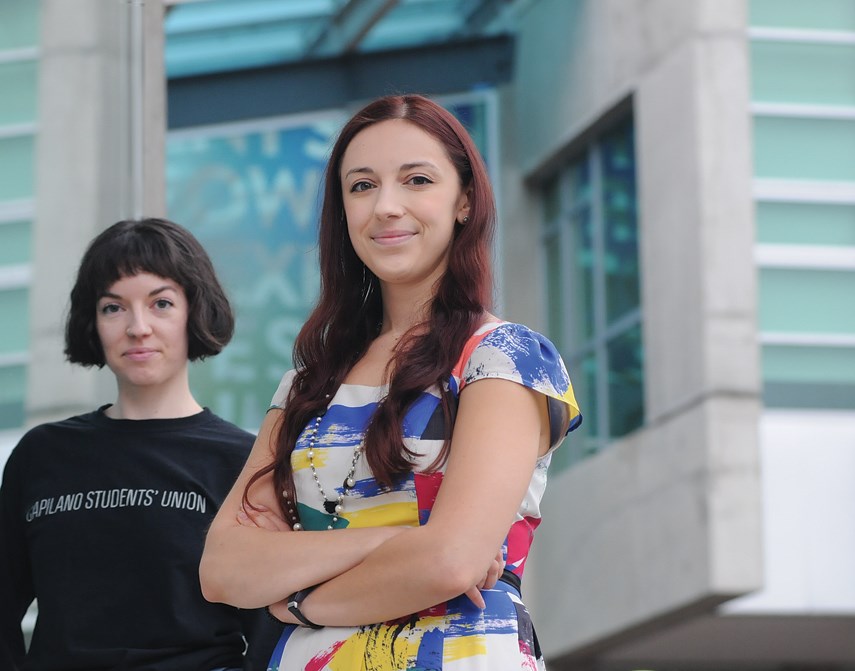The Capilano Students’ Union is working hard to mobilize its members to get out the vote during an election season where voters of all ages have likely grown accustomed to staying in.
The CSU, which represents the student body of Capilano University, has partnered with the Alliance of BC Students for the provincewide Take It Over campaign.
The online campaign aims to mobilize students to vote, whether in-person or by mailing in a ballot, and take over the discourse concerning the upcoming provincial election, according to Grace Dupasquier, vice president external at CSU.
The first goal of the campaign, said Dupasquier, is to help students feel empowered to vote by providing a platform for them to access accurate information about the election, such as how they can vote, where they can vote, and what they need in order to cast a ballot.
“The second piece of this campaign is to bring the concerns of students directly to the candidates,” said Dupasquier. “They can go to TakeItOver.ca where they are able to rank their top concerns for the election, as well as input a few of their own if they’d like, and those rankings and those inputs are sent over directly to the party leaders – but also to the local candidates in their ridings.”
During last year’s federal election, the CSU deployed street teams to meet students on campus and inform them about the electoral process while encouraging them to vote.
That in-person element of the CSU’s campaign for this election has been largely waylaid due to COVID-19, said Dupasquier.
“At Capilano, for example, only 10 to 20 per cent of students that would normally be on campus are on campus right now in order to enforce social distancing,” she said.
Instead, the CSU and Alliance of BC Students have opted for a largely online campaign which will involve outreach education through social media.
For example, a series of candidate Zoom sessions for the North Vancouver-Seymour riding were scheduled recently which encourage young voters to tune in and hear what their potential MLAs had to say about their platforms and issues facing young people.
“The interviews and Zoom sessions are going to be recorded and people can watch them on our social media pages whenever they have time,” said Dupasquier.
In response to the stereotype that younger voters are politically disengaged, Dupasquier fired back.
“We know that that’s not true,” she said. “Just look what’s happened over the last year: we’ve had huge protests for climate justice, for racial equity, and that’s driven by young people. They are obviously politically engaged and they want to see change in the system.”
In addition to calls to action surrounding climate justice, an end to systemic racism, and re-investing in post-secondary education, Dupasquier said young voters will likely be casting their votes for candidates that offer a compelling post-pandemic economic recovery plan.
“And I’m not talking about industry recovery, I’m talking about people that can’t put food on their table, that can’t pay their rent. This is a crisis that’s really exposed the nature of just how precarious people’s situations were pre-pandemic,” said Dupasquier. “A plan to make sure that if this does happen again, we’re not going to be in this same situation.”
Capilano University political science instructor Tim Schouls agreed that young voters definitely have the capacity to significantly alter the election outcome, though he predicted voters of all ages and backgrounds will be more passive this provincial election compared to the 2017 campaign.
“I think that’s a function of the circumstances – the difficulty of getting to the polling booth, the confusion around who the candidates are if you secure a mail-in ballot, people are preoccupied with just basic coping and survival in the midst of this pandemic. Everything is more difficulty than it would be normally,” said Schouls.
While he said voters might feel less inspired to participate in this election compared to past ones, he still predicted the NDP would cruise to victory after polls close on Oct. 24. “The NDP still feel fairly fresh to British Columbians given that we had the Liberals in power for so long,” said Schouls. “There’s still a fair amount of generosity.”
More information about the Take It Over campaign, including a tool to contact local candidates, can be found at TakeItOver.ca. To connect with the Capilano Students’ Union about the campaign, including upcoming virtual candidate events, visit their website (csu.bc.ca) or Instagram page (instagram.com/CapStudentUnion).



